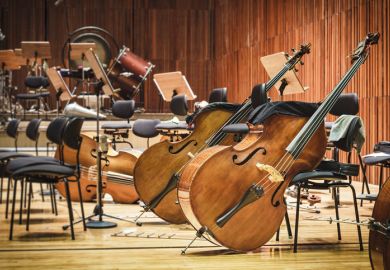Opera seria has long had a bad name. The artificial toy of courts and aristocrats, its texts rule-bound, based on myths or episodes from ancient history falsified to allow love tangles with a happy ending, its music bent to the demands of virtuoso singers many of them (the castrati) unmatchable today, its form a row of static arias held apart by boring recitatives - such, early this century, was the critical norm. Greater openness over the past few decades can still run into disappointing experience: in the theatre Handel's da capo arias can seem long, titivated though they may be with business he never dreamt of.
Now Reinhard Strohm comes out boldly for a total revaluation of dramma per musica - the formal designation of the genre between about 1690 and 1790, and, he maintains, a proper one. "Drama" and "opera" were not then separate; opera seria was the national art form of Italy, produced at a rate of up to 50 new works a year until, from mid-century, comic opera began to outstrip it. The genre embodied a reform movement in favour of noble simplicity, imitation of nature and human dignity, with strong appeal to the educated through much of Europe; like other Enlightenment theatre "it participated in the taming of the passions through ritualistic and beautified reenactment of human conflicts, and it shared the desire to develop society through rational designs".
Strohm is a scholar who works through essays. A 1979 book (published in German and Italian) consisted of essays on individual 18th-century Italian operas; the present book collects work of the past ten years, translated by the author in fluent, at times epigrammatic style. As usual in such collections, certain themes come up repeatedly; one or two chapters will interest specialists only. No matter: after the general introduction the essays may deal with individual operas (Handel's Ariodante, Tolomeo, and Arianna in Creta), librettos (Antonio Salvi's Amore e maesta, an example of the not-so-uncommon tragic ending), and developments (the shift in Germany towards Italian opera, in Venice towards Neapolitan composers), but they nearly all carry forward Strohm's thesis that dramma per musica, studied in the context of theatre in general and of social history, matters and makes sense. The book deserves to be read by many besides musicologists.
Most often ground in are the Aristotelian categories of (in order of importance) subject, ethos, pathos, diction, music, and decoration; another frequent theme is the concern among the reformers known collectively as the Arcadia for verisimilitude, decorum, gesture and rhetoric. We need to think ourselves back into 18th-century minds where these ideas ruled and shaped the genre, Strohm contends.
That the French classical tragedy of the Corneille brothers, Racine, and others influenced the Arcadians is not new; Strohm, however, systematically ex£ its influence in matters like liaison des sc nes (the practice of not leaving the stage empty within an act), the unities (that of place being interpreted generously to allow shifts within one overall location), and integration (even a festive-sounding overture may be relevant to the drama, in mood rather than through musical themes).
Hierarchy, verisimilitude and decorum, he shows, ruled much operatic practice that may seem arbitrary. Metastasio's librettos, set by one composer after another, embodied the cult of decorum by showing forth the validity of honour and good manners and the enlightened ruler's need for self-abnegation. Because people worried about verisimilitude, arias had to avoid carrying forward dialogue. That, however, did not mean that they were all static, dwelling on one inward emotion. Certain well-understood, at times contradictory states authorised them; one might address them to ghosts, divinities, or one's own conscience. Choruses, where they were not, as in Handel's Ariodante, throwbacks to baroque practice, had to be justified rationally.
With the increasing role of music, the composer - Hasse or Jommelli - began to embody the drama in the orchestra, at times against the apparent grain of the text: "music gradually learned to say what dramatists had never dreamed of saying", and this "musicalisation of the drama" carried the genre forward in changed form into the 19th century.
If we will only think ourselves into 18th-century minds we shall no longer perceive dramma per musica as incoherent: so Strohm impels us to conclude. Admirable - but what might it mean for producers and audiences in the theatre?
Strohm is far from advocating a pallid "authenticity". In his 1979 book he wanted singers to bring to dramma per musica the emotional communicativeness of pop stars. Here he states his conviction that an 18th-century opera troupe "presented Metastasio's Artaserse as what it was meant to be: a thriller"; he writes of the need to reconstruct styles of performing recitative - an end to cricket chirp.
Yet problems remain. Decorum, to give one example, now means so little that productions of classical tragedy or opera - works that turn on hierarchical distinctions - often show royals or nobles standing while their servants remain seated. Eighteenth-century ears no doubt heard the dramatic nuances Strohm finds in Hasse's scores; would ours? All this apart from the need for virtuoso singing.
When in 1948 London was to host the Olympic Games I urged on the late Nicholas John, "dramaturge" of the English National Opera, the notion of putting on Metastasio's L'Olimpiade, with the delightful text translated by a leading poet and given in Pergolesi's setting. (Greek princes in modern athletic kit, mock shepherds as punks, the odd flying bedstead?). He was tempted but thought the difficulties too great. Since then the ENO's Xerxes has shown one way to put dramma per musica across, the Royal Opera's Mitridate another. The test, though, is not Handel or Mozart; it is Alessandro Scarlatti, Pergolesi, Jommelli, Hasse. There is a way to go.
John Rosselli is an opera critic and emeritus reader in history, University of Sussex.
Dramma Per Musica: Italian Opera Seria of the 18th Century
Author - Reinhard Strohm
ISBN - 0 300 06454
Publisher - Yale University Press
Price - £30.00
Pages - 326
Register to continue
Why register?
- Registration is free and only takes a moment
- Once registered, you can read 3 articles a month
- Sign up for our newsletter
Subscribe
Or subscribe for unlimited access to:
- Unlimited access to news, views, insights & reviews
- Digital editions
- Digital access to THE’s university and college rankings analysis
Already registered or a current subscriber?



